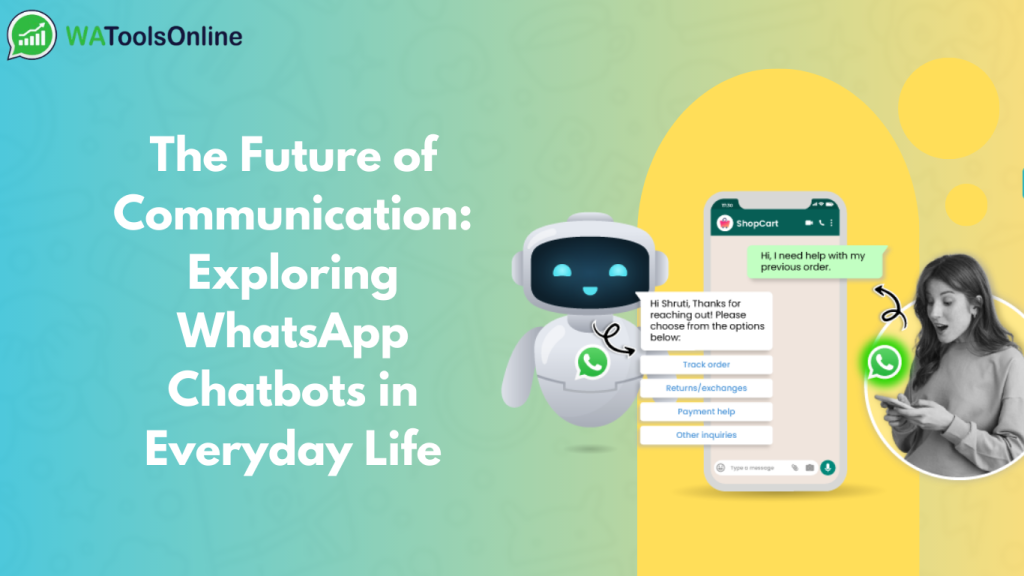In today’s fast-paced digital world, businesses are continually seeking innovative ways to enhance customer communication. One such innovation that has captured attention is the WhatsApp chatbot. Offering a unique blend of accessibility and interaction, WhatsApp chatbots are transforming the way companies engage with customers. In this article, we’ll explore what WhatsApp chatbots are, their benefits, how to build one, and answer some frequently asked questions.

What is a WhatsApp Chatbot?
A WhatsApp chatbot is an automated messaging system designed to engage with users on the WhatsApp platform. Utilizing artificial intelligence (AI) and natural language processing (NLP), these bots can understand customer inquiries and provide relevant responses. Unlike traditional customer service methods, chatbots can operate 24/7, ensuring that customers receive assistance whenever they need it.
Why Choose WhatsApp?
WhatsApp has over 2 billion active users worldwide, making it one of the most popular messaging platforms. This vast user base means that integrating a WhatsApp chatbot can open up numerous opportunities for businesses looking to reach their audience effectively.
Key Features of WhatsApp Chatbots
-
- Automation: Handle inquiries without human intervention.
-
- Personalization: Tailor responses based on user data.
-
- Multifunctional: They can assist in various tasks ranging from customer service to booking appointments.
-
- Real-time Interactions: Engage with customers as soon as they reach out.
The Benefits of Using a WhatsApp Chatbot
Integrating a WhatsApp chatbot into your business strategy can provide numerous advantages.
1. 24/7 Availability
Unlike traditional customer service agents, chatbots never sleep. Customers can receive immediate responses to their queries, enhancing their overall experience.
2. Cost-Effective
Employing a WhatsApp chatbot can significantly reduce operational costs. Instead of hiring a large customer service team, businesses can streamline interactions through automation.
3. Improved Customer Engagement
WhatsApp is a platform that consumers already use daily. A chatbot on this platform means customers are more likely to engage due to the familiar environment.
4. Data Collection and Insights
Chatbots can collect data from interactions that can help businesses understand customer preferences and behaviors, leading to improved service offerings.
How to Build a WhatsApp Chatbot
Creating a WhatsApp chatbot may seem daunting, but following these steps can simplify the process.
Step 1: Define Your Goals
Before you start building, clarify what you want your chatbot to achieve. It could be anything from answering FAQs to facilitating purchases.
Step 2: Choose a Bot-Building Platform
Several platforms like Dialogflow, Chatfuel, and ManyChat enable businesses to create chatbots without extensive coding skills.
Step 3: Obtain WhatsApp Business API Access
To deploy a chatbot, you’ll need access to the WhatsApp Business API. This can involve some application processes, so ensure that you meet WhatsApp’s requirements.
Step 4: Design Conversation Flows
Map out potential user interactions. Use tools like flowcharts to visualize how conversations will progress based on user inputs.
Step 5: Develop and Test Your Bot
After building your bot, rigorously test it with different scenarios to ensure it responds accurately and efficiently.
Step 6: Launch and Monitor
Once satisfied with the testing, launch your chatbot. Remember to monitor the interactions continually to identify areas for improvement.
Examples of WhatsApp Chatbots in Action
1. Customer Service
Many retail brands use WhatsApp chatbots to address customer inquiries. For example, Zara’s chatbot can help customers find store locations, check product availability, and track orders.
2. Booking and Reservations
Restaurants like Domino’s allow customers to place orders directly through WhatsApp, simplifying the ordering process and enhancing the user experience.
3. Marketing and Promotions
Brands can use chatbots to send personalized promotions based on previous customer interactions, ensuring higher engagement rates.
Best Practices for WhatsApp Chatbots
Keep Conversations Natural
Ensure that chatbots use a conversational tone. Avoid technical jargon, and aim for a friendly, approachable style.
Update Regularly
Monitor chatbot interactions and update responses based on changing customer needs or feedback. Regular updates ensure that your bot remains relevant.
Limit Complexity
While advanced AI technologies might be tempting to implement, it’s essential to keep interactions straightforward. Users should easily achieve their objectives without facing cumbersome processes.
Provide a Human Backup
Sometimes, issues may arise that a chatbot cannot handle. Integrating an option for users to connect with a human agent is crucial to ensuring customer satisfaction.
FAQs about WhatsApp Chatbots
What are the limitations of WhatsApp Chatbots?
While WhatsApp chatbots can handle a wide array of inquiries, they may struggle with complex issues that require human judgment or emotional understanding. Additionally, they rely on the data inputted by users, so if users provide vague or unclear messages, the chatbot might not provide accurate responses.
Can my business create multiple chatbots for WhatsApp?
Yes, businesses can create multiple chatbots for different functions. For example, one chatbot might focus on customer service, while another could handle order processing.
Do I need coding skills to build a WhatsApp chatbot?
No, many platforms that allow the creation of chatbots don’t necessitate coding skills. These platforms often provide user-friendly interfaces to build and train your bot easily.
How do I ensure user data is secure?
Using encryption and adhering to privacy regulations such as GDPR can help safeguard user data. Always inform users about how their data will be used.
Are WhatsApp chatbots suitable for all businesses?
Yes, almost any business can benefit from a WhatsApp chatbot. However, the effectiveness will depend on how well it addresses the specific needs of its target audience.
Conclusion
The rise of WhatsApp chatbots represents a significant advancement in business communication. With their ability to automate interactions, remain available 24/7, and provide insightful data, they are poised to become a standard in customer engagement. By understanding how to build and implement an effective WhatsApp chatbot, businesses can significantly enhance their customer relationships and streamline their operations.
Whether you’re a small business owner or part of a large corporation, the potential of WhatsApp chatbots is undeniable. Embrace this technological advancement and elevate your customer interactions to new heights!
